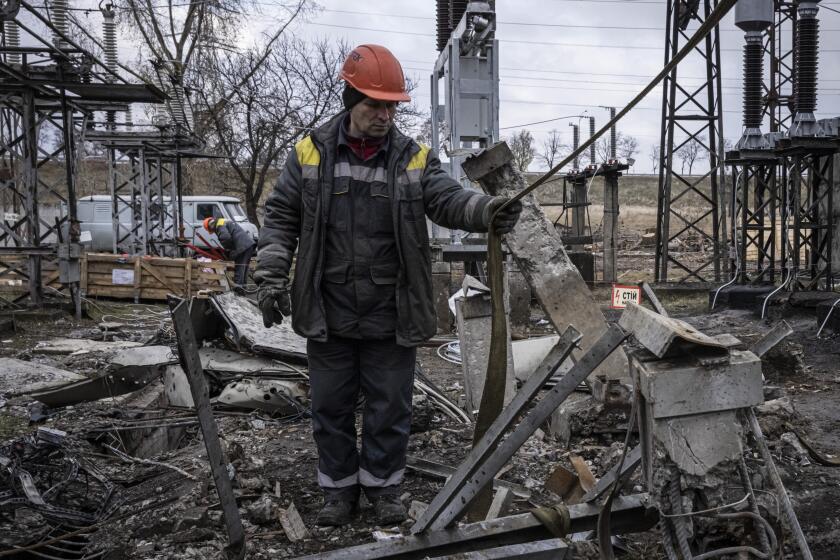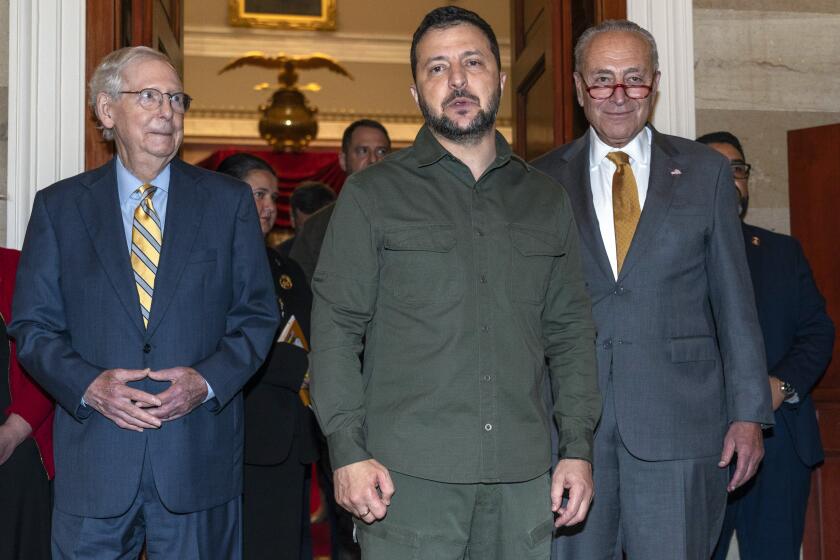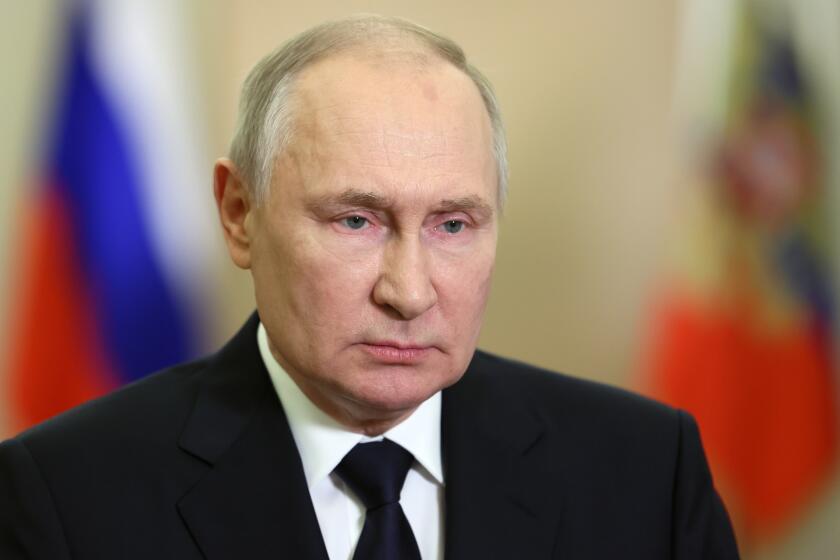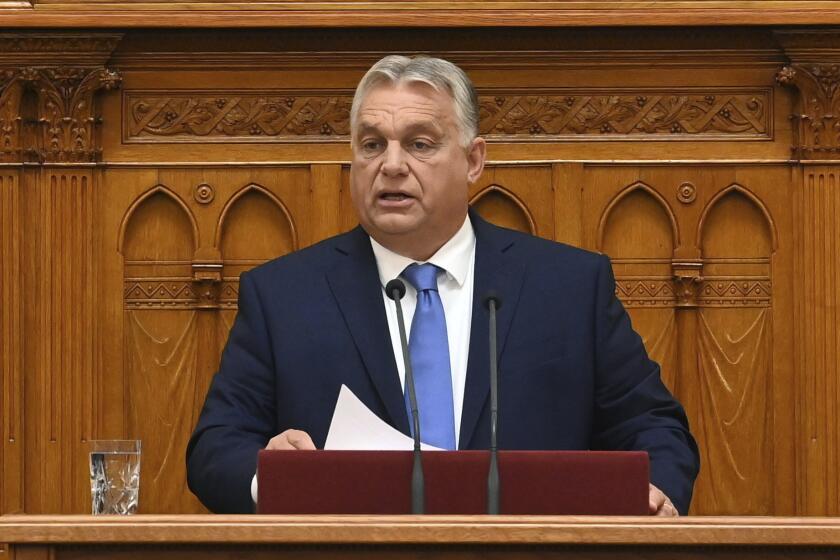Russian missile attack in east Ukraine kills 10-year-old boy and his grandmother
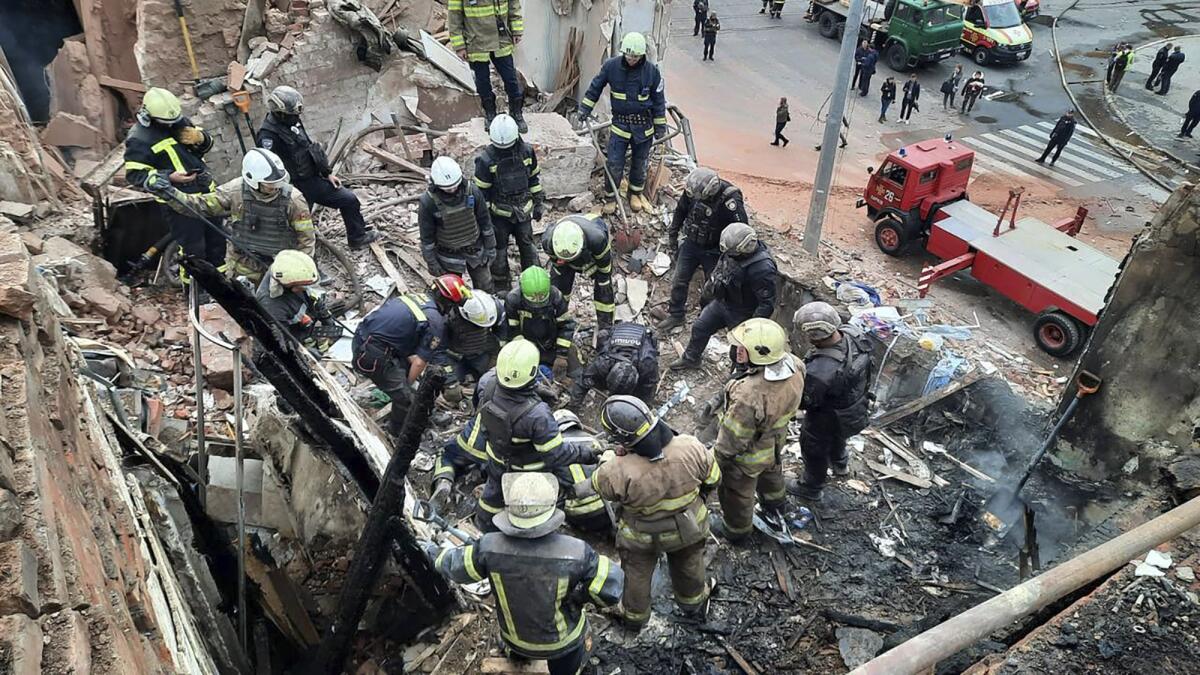
- Share via
KHARKIV, Ukraine — A Russian missile strike killed a 10-year-old boy and his grandmother Friday in the northeastern Ukrainian city of Kharkiv, officials said. Elsewhere in the region, villagers prepared to bury their dead after a strike the previous day killed at least 52 civilians in one of the deadliest attacks in the war in months.
Associated Press reporters saw emergency crews pulling the boy’s body from the rubble of a building after the early-morning attack. He was wearing pajamas with a Spider-Man design.
The strike also killed the boy’s grandmother and injured an 11-month-old baby, Interior Minister Ihor Klymenko said on Telegram. Regional Gov. Oleh Sinegubov said 30 people were wounded and rescue operations were continuing.
Officials said preliminary information indicated that Russian forces used two Iskander missiles in the attack, the same as in the previous day’s attack on the eastern village of Hroza that killed 52 civilians.
In Hroza, workers at the local cemetery Friday cut down trees and mowed grass to prepare graves for those killed. They are to be buried not far from Ukrainian soldier Andrii Kozyr, whose wake they were attending when the strike happened.
Many people in the village of around 300 lost relatives or friends in the attack. They gathered to mourn in groups in the village center, which was largely deserted except for people picking up humanitarian aid, including materials to repair their damaged houses.
Russian attacks plunged Ukrainian cities into darkness last winter. War-weary citizens brace for more blackouts amid a rush to protect Ukraine’s electrical grid.
In a courtyard near the cafe wrecked by the missile, people placed candles and flowers to honor the dead.
In Kharkiv city, one of Friday morning’s missiles landed in the street, leaving a crater, and the other hit a three-story building, setting it ablaze, according to Gov. Sinegubov.
Debris and rubble littered the street. Surrounding buildings were blackened by the blast, which blew out windows and damaged parked cars.
Yevhen Shevchenko, a resident of a nearby nine-story building, said he was in bed when the attack occurred.
“There was a blast wave, a powerful explosion. It blew out the windows and doors in the apartment,” he said.
Biden says there’s ‘not much time’ to keep aid flowing to Ukraine and Congress must ‘stop the games’
Congressional supporters of Ukraine say they won’t give up after a bill to keep the federal government open excluded Biden’s request for more security aid.
Kremlin spokesman Dmitry Peskov denied Friday that Russia was responsible for the Hroza attack. He insisted, as Moscow often does, that the Russian military doesn’t target civilian facilities, despite independently confirmed evidence to the contrary.
The Hroza victims made up most of the civilians killed in the country over the previous 24 hours, Ukraine’s presidential office said Friday.
The office of the United Nations human rights chief, Volker Turk, said he was “shocked and saddened” by the Hroza attack.
Turk’s office said on X, formerly Twitter, that its human rights monitors intended to visit the site and collect information. “Accountability is key,” it said.
Russian President Vladimir Putin has released an address marking the one-year anniversary of Moscow’s unilateral annexation of four Ukrainian regions.
Ukrainian President Volodymyr Zelensky, attending a summit of about 50 European allies in Spain, called the strike a “demonstrably brutal Russian crime” and “a completely deliberate act of terrorism.”
His visit to the summit aimed to secure more military aid, among other goals, and Zelensky said late Thursday that his efforts had produced results.
“We will have more air-defense systems,” he wrote on his Telegram channel. “There will be more long-range weapons.”
The air-defense systems are crucial as Ukrainian officials try to prevent attacks such as those in Kharkiv and amid fears that Russia will resume concerted attacks on power facilities during the winter, in a repeat of its tactics last year when it tried to break Ukrainians’ spirit by denying them electricity.
Breaking News
Get breaking news, investigations, analysis and more signature journalism from the Los Angeles Times in your inbox.
You may occasionally receive promotional content from the Los Angeles Times.
Zelensky is also fighting against signs that Western support for his country’s war effort could be fraying.
Concerns over the resupply of Ukraine’s armed forces have deepened amid political turmoil in the United States and warnings that Europe’s ammunition and military hardware stocks are running low.
Sweden said Friday that it plans to send to Ukraine a military aid package worth about $199 million, mainly consisting of 155-millimeter artillery ammunition.
“We are preparing for it to be a long war; therefore we need to design our support long term and sustainably,” Defense Minister Pal Jonson said at a news conference. “It is now important that more countries step up to support Ukraine.”
Hungarian Prime Minister Viktor Orban has cast doubt on the prospect of the European Union starting talks any time soon for Ukraine to join the bloc.
Meanwhile, Russia scrambled a MiG-31 fighter jet to shadow a U.S. Navy P-8A Poseidon patrol plane approaching Russian airspace over the Norwegian Sea, Russia’s Ministry of Defense said. When the Russian jet approached the U.S. plane, the American aircraft turned away from the Russian border, which it did not cross, the ministry said. It said the Russian fighter jet flew “in strict accordance” with international rules and did not “dangerously approach” the U.S. plane.
Such intercepts have become more frequent. Protocols in both Russia and the West call for scrambling fighters if a plane from the other side flies close to one’s border.
More to Read
Sign up for Essential California
The most important California stories and recommendations in your inbox every morning.
You may occasionally receive promotional content from the Los Angeles Times.
